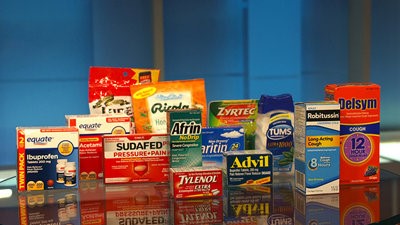DRUGS & ALCOHOL 101
A Parent Resource, presented by Eric Munson, CPP, ICPS
OVER-THE-COUNTER (OTC) DRUG FACTS
Street Terms: Poor man's X, dex, robo, tussin, robo trip, (any over-the-counter medication containing DXM) triple Cs or CCC: (coricidin), SIZ'zurp; purple Drank (cough syrup)

What Are They?
Over-the-counter (OTC) drugs are medications that can be purchased at a pharmacy, grocery, or convenience store without a prescription to treat the symptoms of common colds or pains, such as a headache. The Food and Drug Administration (FDA) has determined that these medications have medical benefits for common ailments and are safe for general consumption if taken exactly as prescribed by the packaging.
However, all drugs, including over-the-counter medications, change the body’s function or chemistry from its natural state and can be harmful if they are not taken as directed. For example, the common painkiller Ibuprofen (more commonly known as Advil®) can cause kidney damage if taken for prolonged periods or in excessive dosages.
As is the case with any drug, overdoses from over-the-counter medications, can occur. One type of over-the-counter medication that is especially dangerous when abused is Dextromethorphan (DXM), which is found in many types of cough syrup. From 1999 to 2004, there was a seven-fold increase in cases of poisoning and overdoses related to the abuse of DXM reported to poison control centers nationwide. Most of these were among 15- and 16-year-olds. An overdose on over-the-counter drugs can vary greatly, depending on what other drugs they are mixed with, the amount of drugs taken, how quickly they are taken, and the individual’s body chemistry. Some over-the-counter drugs can even cause death if used incorrectly.
The only safe way to take over-the-counter medications is to do so exactly as directed by a doctor or as directed on the packaging and to treat the symptoms for which they are intended.
Risks
DXM:
- Impaired judgment and mental functioning
- Loss of coordination
- Dizziness
- Nausea and vomiting
- Hot flashes
- Numbness
- Reactions with other medications
- Increased heart rate and blood pressure
- Hallucinations
- Brain damage
- Seizure
- Death